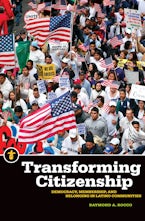In Transforming Citizenship Raymond Rocco studies the “exclusionary inclusion” of Latinos based on racialization and how the processes behind this have shaped their marginalized citizenship status, offering a framework for explaining this dynamic. Contesting this status has been at the core of Latino politics for more than 150 years. Pursuing the goal of full, equal, and just inclusion in societal membership has long been a major part of the struggle to realize democratic normative principles. This illuminating research demonstrates the inherent limitations of the citizenship regime in the United States for incorporating Latinos as full societal members and offers an alternative conception, “associative citizenship,” that provides a way to account for and challenge the pattern of exclusionary belonging that has defined the positions of the Latinos in U.S. society. Through a critical engagement with key theorists such as Rawls, Habermas, Kymlicka, Walzer, Taylor, and Young, Rocco advances an original analysis of the politics of Latino societal membership and citizenship, arguing that the specific processes of racialization that have played a determinative role in creating and maintaining the pattern of social and political exclusions of Latinos have not been addressed by the dominant theories of diversity and citizenship developed in the prevalent literature in political theory.
ContentsTransnational Workers and the Politics of Citizenship, by Rubén O. MartinezForeword, by Suzanne ObolerPrefaceIntroductionChapter 1. Framing the Question of Citizenship: Membership, Exclusionary Inclusion, and Latinos in the National Political ImaginaryChapter 2. Political Theory and Constructs of Membership: Difference and Belonging in Liberal DemocraciesChapter 3. Reconceptualizing Citizenship: Membership, Belonging, and the Politics of RacializationChapter 4. Associative Citizenship: Civil Society, Rights Claims, and Expanding the Public SphereChapter 5. Grounded Rights Claims: Contesting Membership and Transforming Citizenship in Latino Urban CommunitiesChapter 6. Critical Theory and the Politics of Solidarity: Contradictions, Tensions, and PotentialityConclusionAppendix. Methodology: Case Studies, Life Histories, and EthnographiesNotesReferencesIndex

